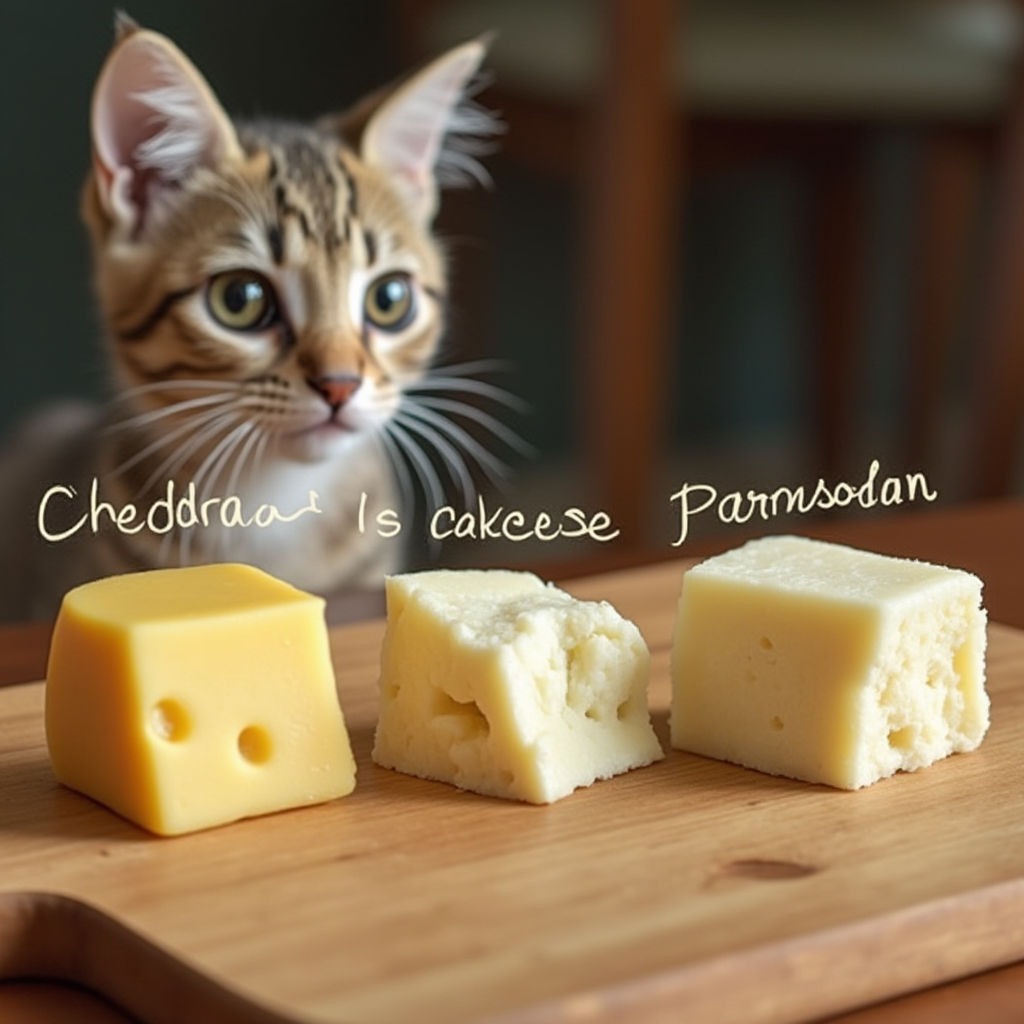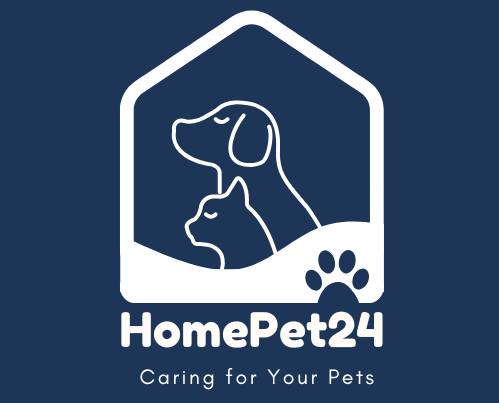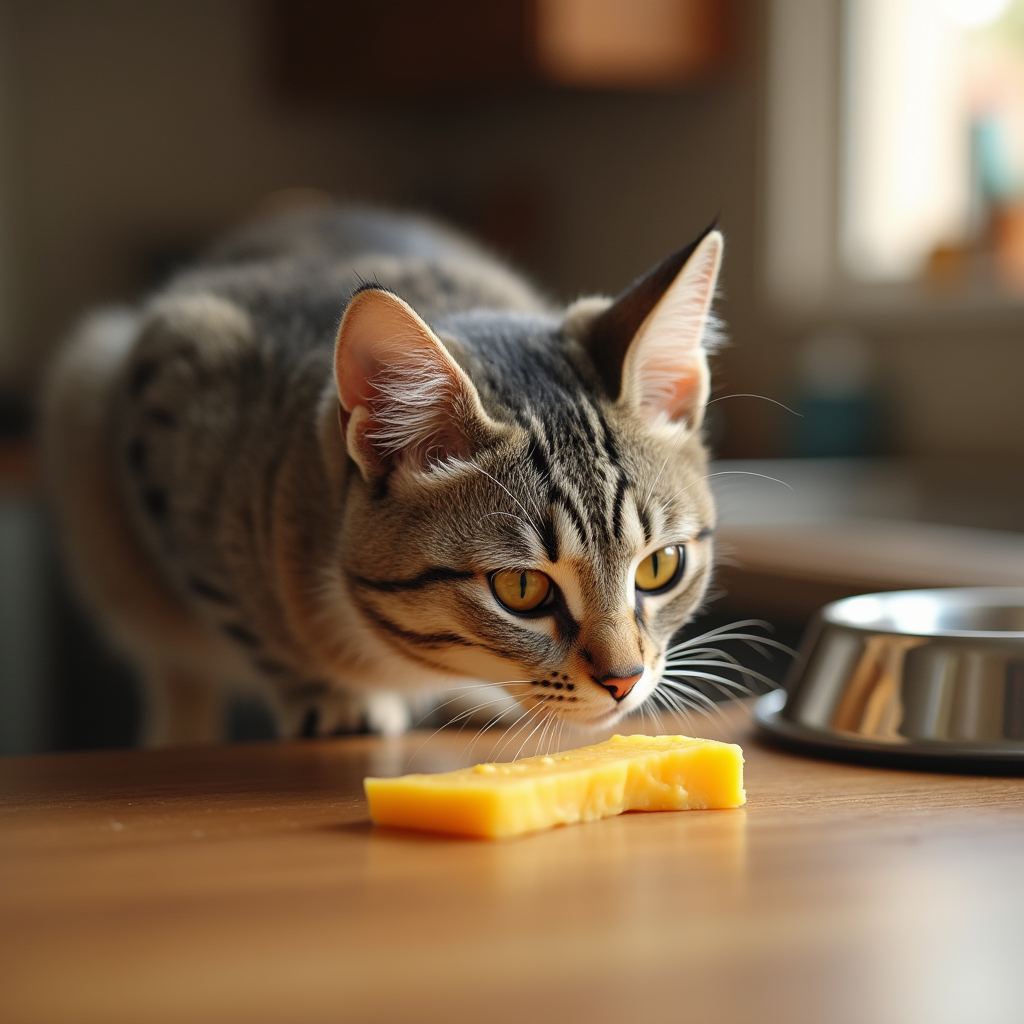Introduction
Cats are naturally curious creatures, and many pet owners have experienced their feline friends trying to sneak a bite of cheese. But is cheese actually safe for cats? While some cats seem to love it, the truth is that dairy products, including cheese, can cause digestive issues in felines. In this article, we’ll explore whether cats can eat cheese, the potential dangers, and the warning signs to watch out for if your cat consumes it.
Can Cats Eat Cheese?
The short answer is: not really. While cheese is not toxic to cats, it is not an ideal treat for them. Most adult cats are lactose intolerant, meaning they lack the enzyme lactase, which helps break down lactose (the natural sugar found in dairy).
Kittens have lactase enzymes while nursing, allowing them to digest their mother’s milk. However, as they grow, they typically lose the ability to digest lactose efficiently. This is why cheese and other dairy products can cause stomach upset in many cats.
Types of Cheese and Their Effects on Cats
Not all cheeses are created equal when it comes to feline digestion. Let’s take a look at different types of cheese and their effects on cats:

1. High-Lactose Cheeses (Risky for Cats)
- Cheddar
- Mozzarella
- Swiss
- American
These cheeses contain higher amounts of lactose and are more likely to cause digestive upset in cats.
2. Low-Lactose Cheeses (Still Not Recommended but Milder Effects)
- Cottage cheese
- Cream cheese
- Parmesan
While these cheeses have lower lactose content, they can still cause stomach discomfort, bloating, and gas.
3. Non-Dairy Cheese (Not a Safe Alternative)
Some pet owners think vegan or non-dairy cheese is a good substitute. However, these products often contain artificial additives, preservatives, and unhealthy oils that can be harmful to cats.
Warning Signs of Cheese Intolerance in Cats
If your cat eats cheese, watch out for these common signs of intolerance:
✅ Vomiting – If your cat throws up after eating cheese, it’s a sign their stomach is rejecting it.
✅ Diarrhea – Loose stools or frequent bathroom trips indicate lactose intolerance.
✅ Stomach pain and bloating – Your cat may appear uncomfortable, avoid food, or act lethargic.
✅ Excessive gas – Digestive discomfort can lead to bloating and increased flatulence.
✅ Lethargy – If your cat seems weak or less active, it may be due to digestive upset.
Safe Alternatives to Cheese for Cats
Instead of giving cheese, consider these healthy cat-friendly treats:
✔ Lactose-free cat treats – Specially formulated for feline digestion.
✔ Cooked lean meats – Small portions of chicken, turkey, or fish make excellent protein-rich snacks.
✔ Cat-friendly dairy alternatives – Some pet stores offer lactose-free milk designed for cats.
When to Contact a Vet
If your cat shows severe symptoms after eating cheese, it’s time to call your vet. Signs that require medical attention include:
⚠ Severe vomiting or diarrhea lasting more than 24 hours
⚠ Allergic reactions (itching, swelling, or difficulty breathing)
⚠ Persistent discomfort or refusal to eat
Your vet can provide guidance and recommend dietary adjustments for your cat’s specific needs.
FAQs
1. Can kittens eat cheese, or is it just bad for adult cats?
Kittens can digest dairy better than adult cats, but it’s still not recommended due to potential digestive issues.
2. How much cheese is too much for a cat?
Even a small amount can cause stomach upset. If you must give cheese, limit it to a tiny nibble occasionally.
3. Are some cat breeds more lactose-intolerant than others?
While lactose intolerance is common in all cats, some breeds (like Siamese cats) may have more sensitive stomachs.
4. Can cheese cause long-term health problems for cats?
Yes. Frequent consumption can lead to obesity, digestive problems, and even pancreatitis.
5. What should I do if my cat accidentally eats a lot of cheese?
Monitor for symptoms like vomiting, diarrhea, or lethargy. If they persist, consult your vet.
6. Is cheese ever beneficial for cats in small amounts?
Cheese contains protein and calcium, but the risks outweigh the benefits for most cats.
7. What cheeses are the least harmful to cats?
Low-lactose cheeses like Parmesan and cottage cheese are milder but should still be given sparingly.
8. Why do some cats seem to love cheese?
Cats are attracted to the fat and protein in cheese, but their bodies aren’t designed to digest it properly.
9. Can I give my cat lactose-free cheese?
While it removes lactose, it still contains fats, sodium, and additives, making it not the best option for cats.
10. Are there any human foods similar to cheese that cats can safely eat?
Yes! Small amounts of plain, cooked meats (chicken, turkey, or fish) are much safer alternatives.
Final Thoughts
While cheese is not toxic to cats, it is not a recommended treat due to the risk of digestive issues and lactose intolerance. Instead, opt for healthier, cat-friendly alternatives that provide the nutrients your feline friend needs.
Would you ever consider giving your cat cheese? Let us know in the comments! 🐱🧀

